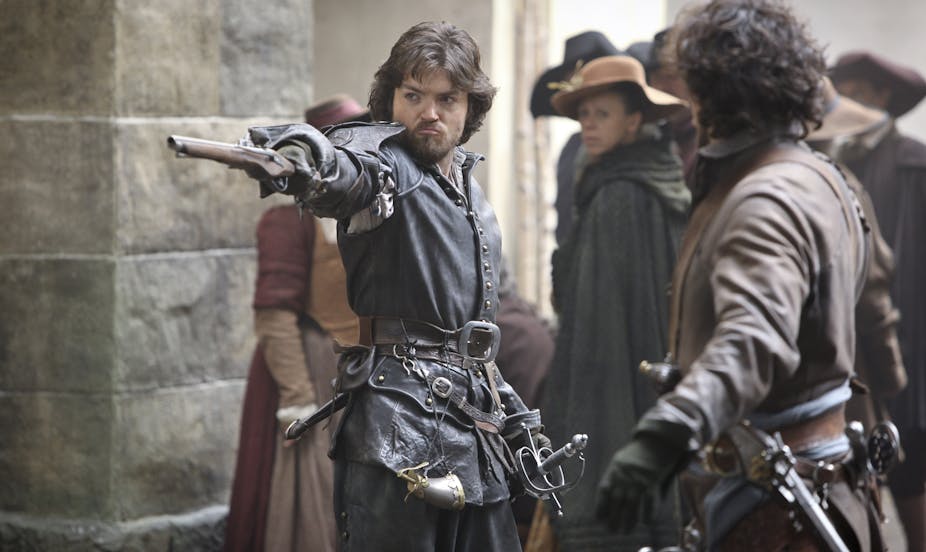BBC One’s swaggering epic The Musketeers has concluded with much skulduggery and winning of honour. A second series has already been confirmed after the show opened spectacularly with a consolidated audience of 9.3 million (the most successful drama opening since Call the Midwife in January 2013). However, only 3.9 million tuned into the final episode.
The latest of a series of adaptations of Alexandre Dumas’s classic, the show is an effort on behalf of the BBC to create a franchise-type show that can draw in those viewers of heritage-light period programmes – those who love The Tudors, or even Game of Thrones. These shows are a shift in costume drama programming, away from adaptation and more “serious” period drama to the lighter materials of Mr. Selfridge and The Paradise (and the international ratings behemoth that is Downton Abbey).
The Musketeers follows D’Artagnan and his friends through various scrapes and adventures. It weaves some of the stories from Alexander Dumas’ original novels whilst adding in some nods to contemporary problems and even events. Peter Capaldi is terrific as Cardinal Richelieu, snarling and plotting, but he’s given too little to do and the thin script does him few favours. Doctor Who should give him a bit more room to flex these muscles.
One of the problems with the series is its writing. There are plenty of shows that combine a relatively uncomplicated view of history with adventure and excitement – Da Vinci’s Demons, Dracula, Spartacus, even Sharpe. These kind of heritage guilty pleasures have a certain wit in their approach which The Musketeers completely misses. It is strangely pompous in tone and, fatally, uneven, unsure of whether to be camp or serious.
And its gender politics are sometimes questionable – women are either devious, as with Milady, long-suffering, in the case of Constance, or the unattainably virtuous Queen Anne – although this caricaturing is more a concern of the show’s approach in general to the protagonists (in its defence the show also devoted an entire episode to the problems of being an educated and rebellious woman in 17th century France).
There are some very interesting echoes in the central concerns of the series – assassination, unsettled European nations, terror and the desire for peace, the question of statehood, the role of the military in keeping peace, religious identity – but they are generally underdeveloped.
Despite this, interesting results are thrown up as the show’s unabashedly liberal sense of identity is allowed to clash with an interpretation of the period as repressive. This is particularly seen in the engagement with slavery, something that makes it relatively unique to date. Porthos has been given a back-story that makes him a freed slave. The conflicts and complications that raises in terms of the Musketeers’ goal – they fight against “the business of misery and suffering” – make for an unexpected perspective on the matter, as they are constantly reminded: “slavery is cruel and disgusting, but it is not a crime”.
The show is to be applauded for approaching slavery head on. Most British period drama ignores or marginalises the issues of empire and slavery, preferring to simply not acknowledge them. The spectre of empire – apart sometimes from brief discussions of Ireland – is lacking in, for instance, Downton Abbey, Upstairs Downstairs, or The Village.
Ultimately, despite its unevenness, the interesting thing about The Musketeers is how successful it has been as a piece of pure television diversion. The series demonstrates how historical programming is increasingly not bothered about authenticity (outside of costume and backdrop).
The Tudors has led the way for a swathe of shows that might be called “historical entertainment”, making a nod to the past and period detail but more interested in telling thrilling stories and gathering a new type of viewer. These shows are not concerned with representing the past in any complex way, and the engagement with history that they suggest is principally about pleasure, rather than education.

